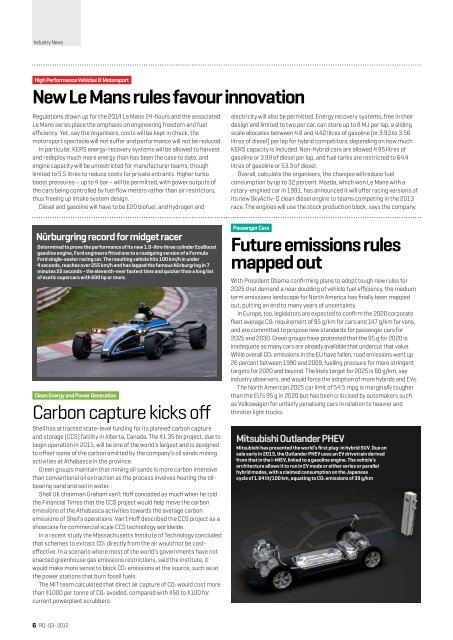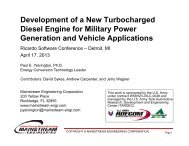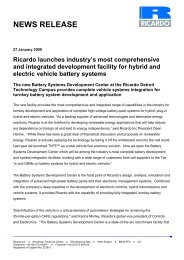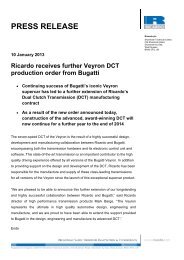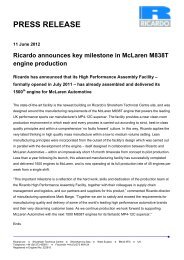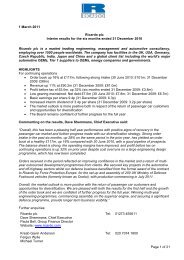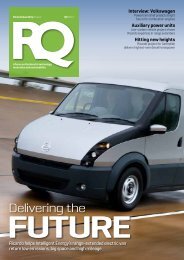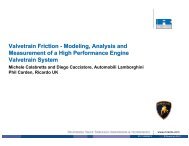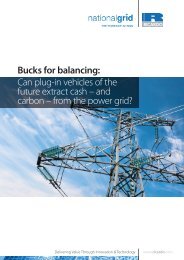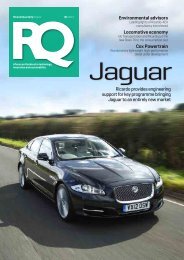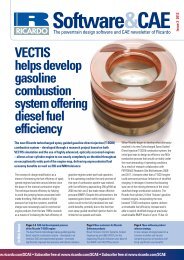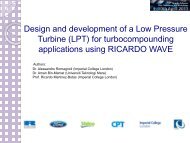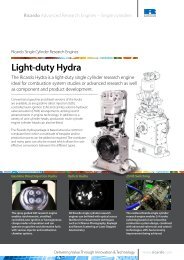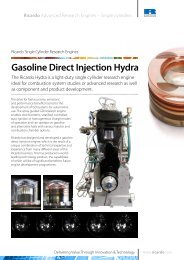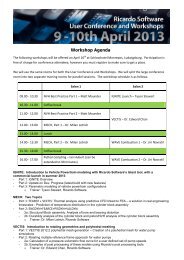HyBoost - Ricardo
HyBoost - Ricardo
HyBoost - Ricardo
You also want an ePaper? Increase the reach of your titles
YUMPU automatically turns print PDFs into web optimized ePapers that Google loves.
Industry News<br />
High Performance Vehicles & Motorsport<br />
New Le Mans rules favour innovation<br />
Regulations drawn up for the 2014 Le Mans 24-hours and the associated<br />
Le Mans series place the emphasis on engineering freedom and fuel<br />
efficiency. Yet, say the organisers, costs will be kept in check, the<br />
motorsport spectacle will not suffer and performance will not be reduced.<br />
In particular, KERS energy-recovery systems will be allowed to harvest<br />
and redeploy much more energy than has been the case to date, and<br />
engine capacity will be unrestricted for manufacturer teams, though<br />
limited to 5.5 litres to reduce costs for private entrants. Higher turbo<br />
boost pressures – up to 4 bar – will be permitted, with power outputs of<br />
the cars being controlled by fuel flow meters rather than air restrictors,<br />
thus freeing up intake system design.<br />
Diesel and gasoline will have to be E20 biofuel, and hydrogen and<br />
electricity will also be permitted. Energy recovery systems, free in their<br />
design and limited to two per car, can store up to 8 MJ per lap; a sliding<br />
scale allocates between 4.8 and 4.42 litres of gasoline (or 3.93 to 3.56<br />
litres of diesel) per lap for hybrid competitors, depending on how much<br />
KERS capacity is included. Non-hybrid cars are allowed 4.95 litres of<br />
gasoline or 3.99 of diesel per lap, and fuel tanks are restricted to 64.4<br />
litres of gasoline or 53.3 of diesel.<br />
Overall, calculate the organisers, the changes will reduce fuel<br />
consumption by up to 32 percent. Mazda, which won Le Mans with a<br />
rotary-engined car in 1991, has announced it will offer racing versions of<br />
its new SkyActiv-D clean diesel engine to teams competing in the 2013<br />
race. The engines will use the stock production block, says the company.<br />
Nürburgring record for midget racer<br />
Determined to prove the performance of its new 1.0-litre three cylinder EcoBoost<br />
gasoline engine, Ford engineers fitted one to a roadgoing version of a Formula<br />
Ford single-seater racing car. The resulting vehicle hits 100 km/h in under<br />
4 seconds, reaches over 255 km/h and has lapped the famous Nürburgring in 7<br />
minutes 22 seconds – the eleventh-ever fastest time and quicker than a long list<br />
of exotic supercars with 600 hp or more.<br />
Clean Energy and Power Generation<br />
Carbon capture kicks off<br />
Shell has attracted state-level funding for its planned carbon capture<br />
and storage (CCS) facility in Alberta, Canada. The $1.35 bn project, due to<br />
begin operation in 2015, will be one of the world’s largest and is designed<br />
to offset some of the carbon emitted by the company’s oil sands mining<br />
activities at Athabasca in the province.<br />
Green groups maintain that mining oil sands is more carbon intensive<br />
than conventional oil extraction as the process involves heating the oilbearing<br />
sand and soil in water.<br />
Shell UK chairman Graham van’t Hoff conceded as much when he told<br />
the Financial Times that the CCS project would help move the carbon<br />
emissions of the Athabasca activities towards the average carbon<br />
emissions of Shell’s operations. Van’t Hoff described the CCS project as a<br />
showcase for commercial scale CCS technology worldwide.<br />
In a recent study the Massachusetts Institute of Technology concluded<br />
that schemes to extract CO2 directly from the air would not be costeffective.<br />
In a scenario where most of the world’s governments have not<br />
enacted greenhouse gas emissions restrictions, said the Institute, it<br />
would make more sense to block CO2 emissions at the source, such as at<br />
the power stations that burn fossil fuels.<br />
The MIT team calculated that direct air capture of CO2 would cost more<br />
than $1000 per tonne of CO2 avoided, compared with $50 to $100 for<br />
current powerplant scrubbers.<br />
Passenger Cars<br />
Future emissions rules<br />
mapped out<br />
With President Obama confirming plans to adopt tough new rules for<br />
2025 that demand a near doubling of vehicle fuel efficiency, the medium<br />
term emissions landscape for North America has finally been mapped<br />
out, putting an end to many years of uncertainty.<br />
In Europe, too, legislators are expected to confirm the 2020 corporate<br />
fleet average CO2 requirement of 95 g/km for cars and 147 g/km for vans,<br />
and are committed to propose new standards for passenger cars for<br />
2025 and 2030. Green groups have protested that the 95 g for 2020 is<br />
inadequate as many cars are already available that undercut that value.<br />
While overall CO2 emissions in the EU have fallen, road emissions went up<br />
26 percent between 1990 and 2009, fuelling pressure for more stringent<br />
targets for 2020 and beyond. The likely target for 2025 is 60 g/km, say<br />
industry observers, and would force the adoption of more hybrids and EVs.<br />
The North American 2025 car limit of 54.5 mpg is marginally tougher<br />
than the EU’s 95 g in 2020 but has been criticised by automakers such<br />
as Volkswagen for unfairly penalising cars in relation to heavier and<br />
thirstier light trucks.<br />
Mitsubishi Outlander PHEV<br />
Mitsubishi has presented the world’s first plug-in hybrid SUV. Due on<br />
sale early in 2013, the Outlander PHEV uses an EV drivetrain derived<br />
from that in the i-MIEV, linked to a gasoline engine. The vehicle’s<br />
architecture allows it to run in EV mode or either series or parallel<br />
hybrid modes, with a claimed consumption on the Japanese<br />
cycle of 1.64 lit/100 km, equating to CO2 emissions of 39 g/km<br />
6 RQ • Q3 • 2012


